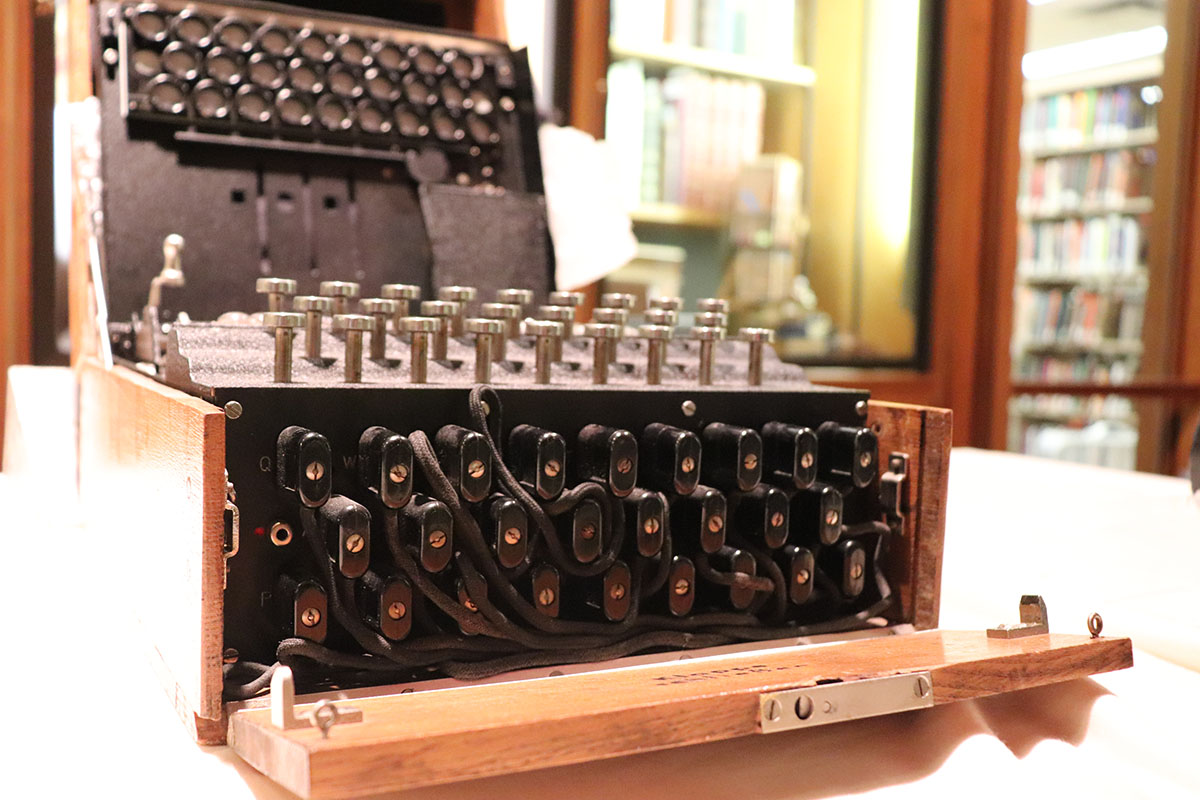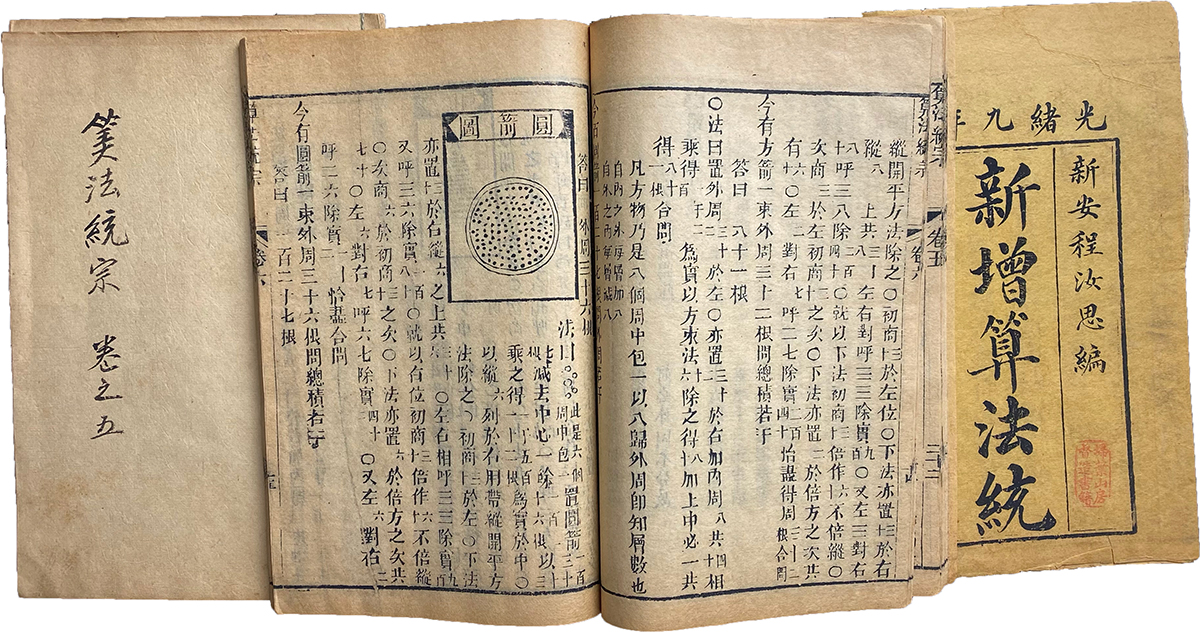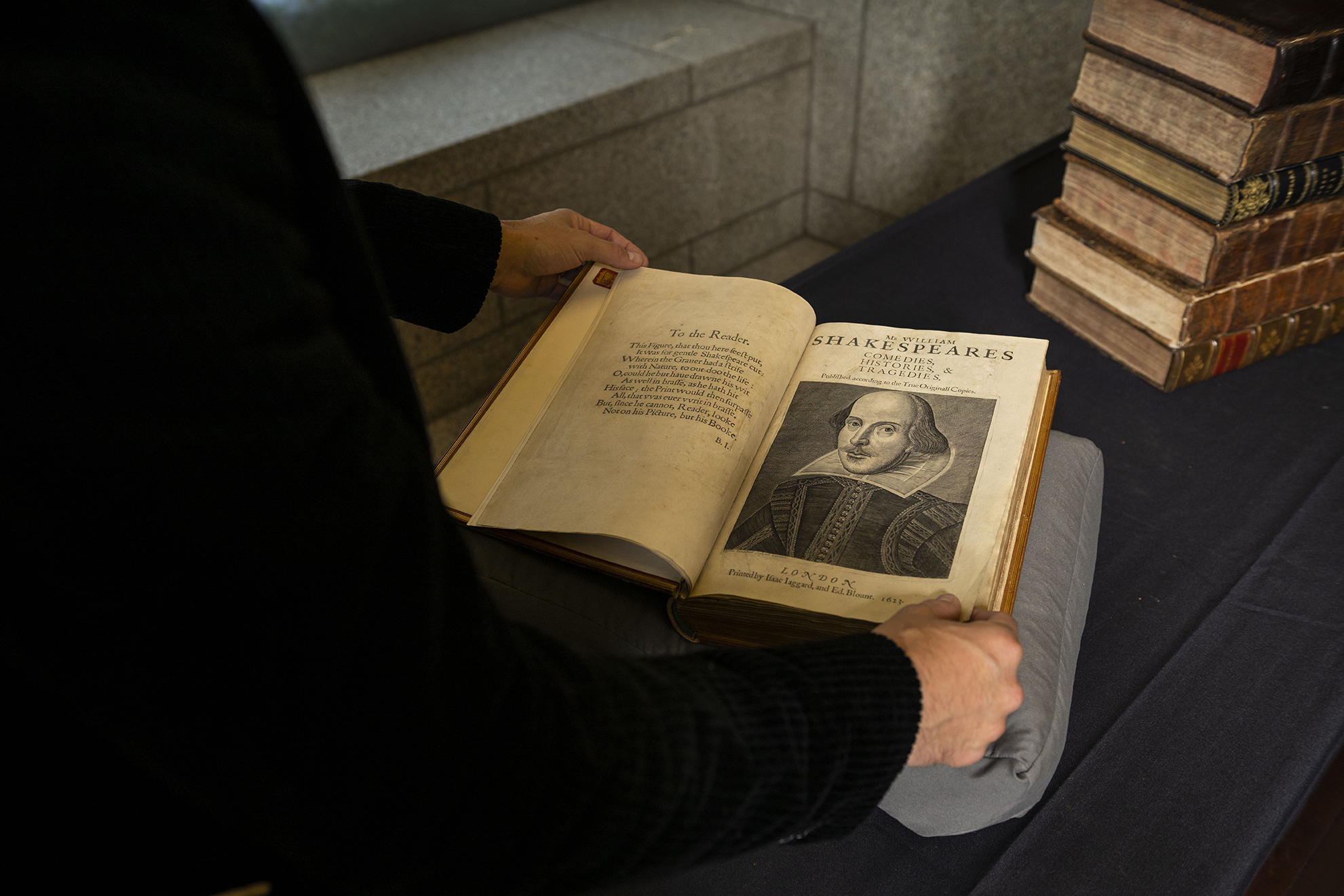
Special Collections is Carnegie Mellon University’s repository for rare books, manuscripts, and historical machines, a treasure trove of historical items that are valuable resources for all corners of the campus community. But when Sam Lemley took over as curator in 2020, he knew it wasn’t a sheer number of materials that would set Carnegie Mellon’s collection apart from other institutions.
Instead, he made it his goal to pursue a narrower focus, to reflect Carnegie Mellon’s unique history and individual strengths through a highly specialized collection. Now, Lemley is working to build the preeminent academic resource in the history of computing, cryptography, and robotics.
Finding Focus
Inspiration came, in part, from two major collections already held by the University Libraries. The Joseph Traub and Pamela McCorduck Collection was donated in 2018 and contains more than 50 calculating machines, letters, and books — as well as two World War II Enigma cipher machines. It also includes the first commercially produced mechanical calculator, and rare books by Charles Babbage, the 19th century mathematician considered by some to be a "father of the computer."
The Posner Memorial Collection comprises approximately 1,000 books, including major works documenting the history of astronomy, mathematics, mechanics, natural philosophy, and technology. These include first editions of Isaac Newton’s Principia Mathematica (London, 1687) and Galileo Galilei’s report and analysis on the discovery of sunspots (Rome, 1613). Together, these two collections contain many significant historical documents in the fields of computing, science, and technology.
“The Traub-McCorduck Collection and the Posner Memorial Collection provide a solid foundation from which Special Collections can grow,” Lemley said. “They lend incredible weight to our claim that Carnegie Mellon is well suited to lead in these areas.”
When looking for new acquisitions, Lemley considers what will be most useful to various courses being taught around campus. He also looks for ways to diversify the collection and increase representation from cultures around the world. This can be a challenge, because Lemley doesn’t read the languages in which many of these books are written, and isn’t always an expert in other cultures and their historical artifacts. But with lots of research and extensive reading, he’s broadening Special Collections’ focus from an exclusively Eurocentric perspective.
“The history of science is, traditionally, focused on Western scientists and mathematicians — and typically that means European thinkers,” Lemley admitted. “But it takes a huge lack of imagination to fail to uncover things that are relevant to this story from any conceivable culture. For me, it’s an essential challenge to fit objects like the Quipu recording device or the Chinese abacus into the narrative we’re building with our collection.”

Expanding Access
Finding books and other artifacts is only half of Lemley’s work — the other half centers around encouraging exciting research, and bringing people into the collection to make use of its resources.
“A huge goal of mine is to make new kinds of work possible with the items we have in Special Collections,” Lemley said. “I want to ask questions like: What happens when you bring together research in rare books and high level expertise in machine learning and AI? We have the opportunity to do groundbreaking work with these resources, working with the impressive knowledge and skills we have accessible at Carnegie Mellon.”
Assisting Lemley in growing the collection and its audience is the Posner Curatorial Intern. The internship is designed for any graduate student who plans to pursue a career in cultural heritage institutions, including work in libraries, archives, and museums. In the past, interns spent their entire term carefully crafting an exhibit for the Posner Center. But Lemley refocused the experience, to give interns a broader experience that could translate into any career in special collections librarianship or work in the cultural heritage sector.
“My objective is to include the intern as much as possible in the day-to-day, to bring them in as a partner in the curatorial work we’re doing,” he explained. “What’s best for the interns — and most useful to the Libraries — is to make sure they get their hands in everything, and leave with tangible skills and the ability to really engage with cultural heritage work.”
Jamie Leach, the first Posner intern since before the pandemic, worked on an exhibition about major texts in the history of science — but also cataloged books, identified potential additions to the collection, and even wrote posts for the Libraries blog. “Overall, the internship gave me a better idea of what library and curatorial work actually looks like on the ground,” Leach said. “Sam and I spent a lot of time working together, but he also gave me plenty of independence to approach the work my own way.”
An additional opportunity for research access to the collection comes in the form of a new research fellowship. Generously funded by the Posner Fine Arts Foundation of Pittsburgh, the fellowship will support a researcher, either at Carnegie Mellon or another university, who would benefit from prolonged research with the Posner collection.
“The Posner Fine Arts Foundation has been very pleased with the care and use of the collection by the CMU University Libraries,” said Executive Director Anne Molloy. “We are very excited about this expansion of the program which will strengthen research using materials in the Posner Collection and also provide valuable work experience and training for students with an interest in the field. We are grateful to Dean Webster and Dr. Lemley for developing these programs, and we look forward to them coming to fruition.”
A Community Resource
The collection is available to anyone on campus, not just advanced scholars.
“When I’m working in the reading room with a researcher, I leave the door open, and I’m always surprised by how many undergraduates wander in,” Lemley said. “They’re amazed to learn that all the books here are in the Libraries catalog — that anyone can come spend time with anything we have. These items may be valuable, but they’re also a part of CMU’s cultural assets. They’re for our community to take advantage of.”
There are plenty of resources for arts and humanities students as well. In the collection of Charles Rosenbloom, there are significant documents to the history of music, including first editions by Beethoven and Bach. There’s the Frances L. Hooper Collection of artwork by Victorian illustrator Kate Greenaway, one of the most extensive in the world. There’s also an incredible painting by Harlem renaissance painter Jacob Lawrence, part of a series of works held in major collections like the Museum of Modern Art and the White House. And Special Collections holds a first edition copy of Mary Shelley’s “Frankenstein,” complete in its original binding.

In the spring, CMU community members and the general public will have the opportunity to access another one of Special Collections’ most precious items firsthand. Carnegie Mellon holds a copy of Shakespeare’s First Folio (1623), the earliest comprehensive gathering of Shakespeare’s plays in print — one of only 230 to survive. The collection preserved 36 of Shakespeare’s plays, half of which had never been printed before and might otherwise have been lost, including “Macbeth,” “The Tempest,” and “As You Like It.” Special Collections also has two copies each of the second (1632), third (1663/4) and fourth (1685) Shakespeare folios.
2023 is the 400th anniversary of the First Folio, and the Libraries plans to celebrate this important milestone with a series of events. On January 19 at 4 p.m., Lemley will introduce the history of the Libraries’ copies of the folios in “Fine and Rare II: Inside CMU Libraries’ Special Collections,” a virtual event open to the CMU community and the general public. On February 20, the exhibit “Inventing Shakespeare” will open in the Hunt Library Gallery in the first floor Emma Sharp Alcove. Then, on April 1, 2023, “From Stage to Page: 400 years of Shakespeare in Print,” opens at the Frick Pittsburgh. It features CMU’s copies of the first, second, third, and fourth folios, and runs until October 1, 2023.
Register for “Fine and Rare II: Inside CMU Libraries’ Special Collections” here, and check back for more information about the exhibits in the coming weeks.
by Sarah Bender, Communications Coordinator
Feature image: WWII Enigma Machine in Special Collection
